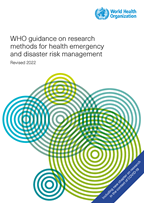
Research Methods for Health EDRM
This comprehensive guidance covers the design, implementation and reporting of research during and after emergencies and disasters.
Evidence is vital to well-informed decision making in Health EDRM. The research that provides this evidence must be high quality and fit for purpose. The WHO Guidance on Research Methods for Health Emergency and Disaster Risk Management was developed in 2021, involving 164 authors from 30 countries, WHO Headquarters and Regional Offices (PAHO, AFRO, EMRO, EURO, SEARO, WPRO). It is a living reference to be updated regularly. In response to the increased demand for research due to the COVID-19 pandemic, WKC in close cooperation with global partners revised the Guidance and launched the updated guidance with a new chapter on how to conduct research in the context of COVID-19 in October 2022.
This comprehensive guidance covers 44 chapters, entailing the design, implementation and reporting of research during and after emergencies and disasters. It aims to provide guidance for researchers, would-be researchers, policy-makers and practitioners in order to:
- Improve the quality of research in Health EDRM.
- Improve the quality of the policy, practice and guidance that is supported by evidence from such research.
- Increase research capacity among researchers and the research community, including new researchers, experienced researchers and teachers of research.
- Strengthen collaboration and engagement between the research community and policy-makers, practitioners and stakeholders for improved Health EDRM.
